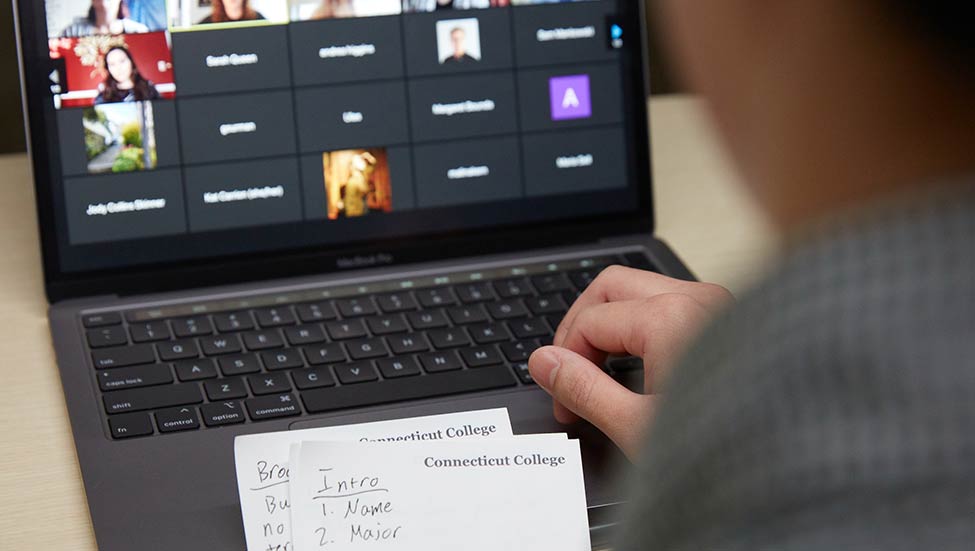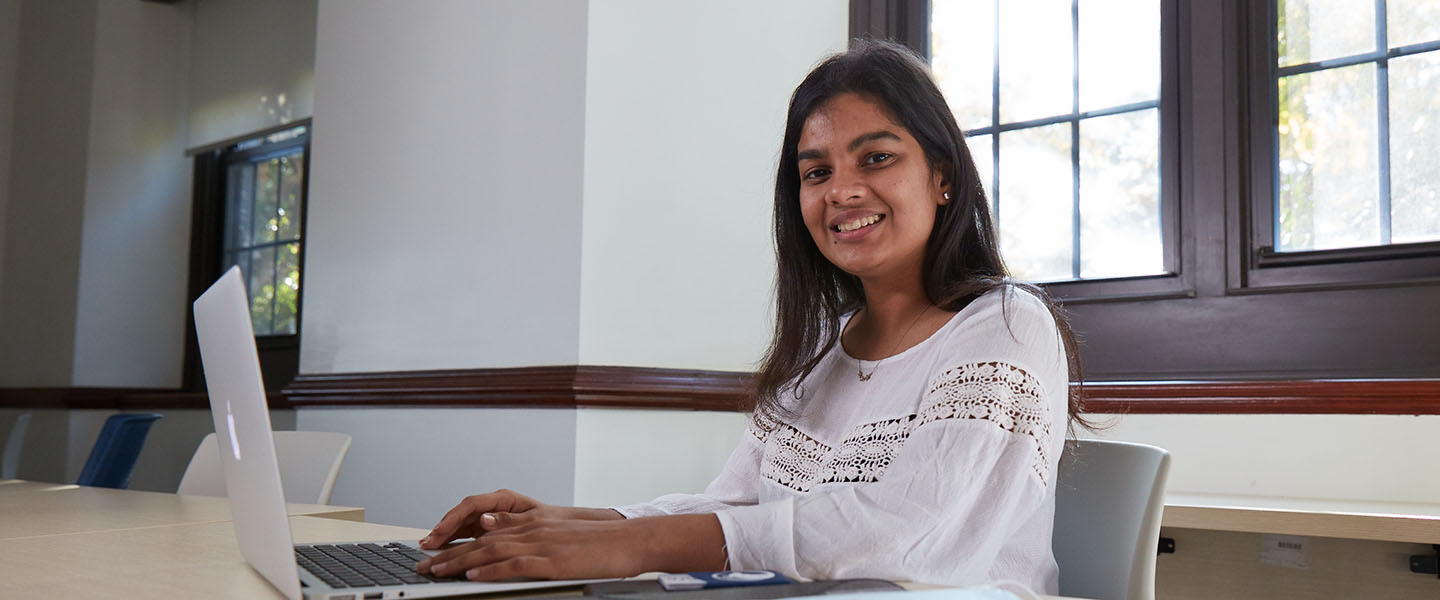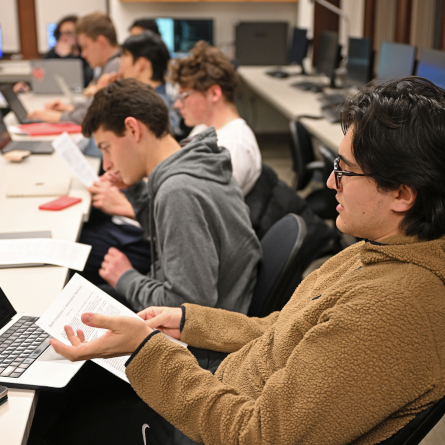
Conn hosts second annual All-College Symposium
In the midst of the worst global pandemic in more than 100 years, Halle Paredes ’21 wanted to know: How do normative ethics influence or guide triage policies and reopening strategies, and what does this look like globally?
Paredes, a philosophy major, government minor and member of the Public Health Pathway, compared the COVID-19 strategies implemented by the governments of the United States, the United Kingdom and Sweden and shared her detailed findings in an interdisciplinary presentation during the second annual All-College Symposium Nov. 6.
“I hope the Symposium audience will question and better understand a lot of the principles that are motivating these public health interventions,” Paredes said. “When a policy is made or a decision is made … it speaks volumes about the populations it affects.”
Paredes was one of nearly 200 seniors in Conn’s Interdisciplinary Pathways and Centers for Interdisciplinary Scholarship who participated in the virtual day-long Symposium, which highlighted students’ integrative learning through Connections, Conn’s reinvention of the liberal arts.
Through virtual talks, panels, group discussions, poster sessions and videos, the student presenters showcased the connections they have made among their courses and research, their jobs and internships, their work in local communities and around the globe—along with the questions that animated their choices along the way. A virtual preview gallery was available several days before the event.
President Katherine Bergeron said she was extremely proud of the seniors, who are the second cohort to complete Connections and the first to do so in the midst of a global pandemic.
“You tenacious students of the Class of 2021 have overcome countless obstacles to do independent research, to find internships in a virtual environment, to complete works of art and performance while maintaining social distance, and to find new ways of making a lasting impact on your communities,” she said.
The presentations covered a diverse range of topics, including unequal access to STEM in the U.S., the global momentum around blue finance, Latinx political participation, the sustainability of global supply chains, and the mediation efforts to end the war in the Donbass region of Ukraine.
“Our virtual All-College Symposium is a testament to the intrepid and creative spirit that defines Connecticut College,” said Dean of the College Jefferson Singer. “Our students, faculty and staff have rallied to make our second annual Symposium a cornucopia of ideas and conversations that exemplify the best in integrative learning and liberal arts education. We could not be prouder that, in these unsettled times, they took on some of the most challenging questions in contemporary society—racism, climate change, economic access—through an interdisciplinary lens and shared the fruits of their thoughtful inquiries with us.”

Max Whisnant ’21, an aspiring politician, joined the Peace and Conflict Pathway to better understand political conflicts and learn to develop solutions. A government and English double major, Whisnant interned for U.S. Representative Joe Kennedy’s U.S. Senate campaign in Massachusetts and developed an interest in political rhetoric.
“I realized that language matters. It can move us, it can affect the ways we think and the ways we act,” he said. “Even in a Democratic primary, I was able to study and focus on how messaging works to motivate voters, or even de-motivate voters.”
Whisnant, who is now completing an honors thesis on presidential rhetoric during catastrophic times, was part of a group presentation along with the eight other seniors in the Pathway that included a prerecorded video and a live virtual panel discussion.
“The Peace and Conflict Class of 2021 has come to be a real learning community—a community that is well more than the sum of its parts,” said Catherine Stock, Peace and Conflict Pathway coordinator and Barbara Zaccheo Kohn ’72 Professor of History. “This group has taken the Peace and Conflict Pathway and made it their own … they have made real what those of us who have been on the ground floor of Connections had hoped would take place.”
Journee Hardaway ’21 and Darriana Greer ’21, both members of the Bodies/Embodiment Pathway, also presented together. Hardaway, a dance and sociology double major, studied abroad in Trinidad and Tobago, where she learned about the country’s colonial past, engaged in cultural events, experienced Dancehall and was introduced to Maroon community dance. Greer, a dance and Africana studies double major and sociology minor, studied abroad in Ghana, where she learned about Ghanaian history and culture through song, drumming and dance. At the Symposium, they presented, “A Deep-Rooted Connection: Uniting the African Diaspora Through Rhythm and Dance,” drawing connections between three types of circle dances in Ghana, Trinidad and Tobago, and the United States.
“We have seen throughout history that circle dance migrated from its roots in Africa as the diaspora expanded,” Hardaway said. “The body’s position in a circle signifies a whole group, and allows individuals to be part of something larger than themselves.”
Greer added that while each type of dance has evolved to reflect the cultural identities of the people in the different geographical locations, “that connection through rhythm and dance remains and continues to be a defining element of identities of people throughout the diaspora.”
The Symposium ended with a celebration over Zoom, featuring remarks by Bergeron, Singer, Whisnant and Holleran Center for Community Action scholar Stephanie Martinez ’21, a government major and history minor who presented her research on Latinx political participation earlier in the day. It concluded with a video of the Dance Department’s live, outdoor performance “Reach,” choreographed by Associate Professor of Dance Lisa Race and performed by students.
“Through the Connections program, we have been able to grow our confidence in our expertise and engage in our interests, which has been heavily encouraged and fostered by our faculty and staff," said Martinez.
"We will always be connected by the work we did these past three years, even as our post-college lives take us to different parts of the world. Amidst all the uncertainties, I look forward to the ways the members of the Class of 2021 will yield the tools and knowledge presented today to positively engage with their communities.”

